Intelligent Virtual Assistants (IVA) leverage artificial intelligence to provide personalized support to users. By simulating human conversation, they interact with individuals, offer information, and complete specific tasks.
But how to make the most out of this technology and have it cater to your particular needs?
Don’t worry—we’ll show you what to do.
This time around, we’ll look into how to leverage these types of virtual assistants to streamline customer support processes and enhance user experiences.
Let’s dive right in!
Maximize your support’s efficiency with Tidio’s virtual intelligent assistant
Let’s start from the top—
What is an Intelligent Virtual Assistant (IVA)?
An Intelligent Virtual Assistant or Agent (IVA) is an AI-powered software designed to simulate intelligent conversations with users. IVAs use advanced natural language processing (NLP), natural language understanding (NLU), and machine learning (ML) algorithms to understand customer queries.
These tools can provide relevant information, complete tasks, and offer personalized assistance to customers. On top of that, IVAs can be integrated into various platforms such as websites, mobile apps, and messaging systems, providing users with a seamless and interactive experience.
Tidio’s Lyro AI is one of the great virtual intelligent assistant examples capable of delivering answers to user queries in a natural, conversational-like manner:

Overall, IVAs serve as computer-generated agents that enhance user engagement, streamline processes, and deliver efficient support across a wide range of industries.
Read more: Learn how Lyro, an intelligent AI assistant helped automate and enhance Tidio’s support operations.
Now, before we continue, it’s important to make a distinction—
Intelligent virtual assistant vs. a chatbot
The main difference between an intelligent virtual agent (IVA) and a chatbot lies in their level of sophistication and capabilities. While both are computer programs designed to interact with users, IVAs are more advanced and intelligent compared to traditional, rule-based chatbots.
IVAs are equipped with natural language processing and machine learning, allowing them to understand complex user queries and offer more natural and human-like interactions. These virtual agents are capable of learning and adapting over time, making them more efficient in handling a wide range of tasks and scenarios.
On the other hand, FAQ chatbots or chat flows are simpler, rule-based programs that rely on predefined responses and patterns to interact with users. Chat flows are usually more scripted and limited in their ability to understand nuanced language or context. They are typically used for basic tasks such as answering FAQs, providing simple information, and guiding users through predefined workflows.
In essence, IVAs offer a more advanced and interactive virtual assistant experience, while chatbots provide a more basic and scripted form of user interaction.
Okay—
It’s time to find out how IVAs work in more detail.
How do IVAs work?
When a user talks to the assistant, the IVA software uses NLP, ML, and AI technologies to analyze the input, understand the context of the conversation, and generates a relevant response.
Let’s examine in more depth what each technology brings to the table when it comes to IVA’s working process.
- Natural Language Processing (NLP)—enables IVAs to understand and interpret human language, analyze user queries, identify keywords, and extract meaning from text or speech
- Machine Learning (ML)—helps with continuous learning and improvement by analyzing vast amounts of data from user interactions. Through ML, virtual AI assistants can identify patterns, improve language understanding, and refine responses based on client feedback, ultimately enhancing the overall user experience.
- Artificial Intelligence (AI)—acts as the central intelligence of IVAs, enabling them to process information, make decisions, and generate relevant responses. AI technologies power the decision-making capabilities of IVAs, letting them provide personalized and accurate support.
And here’s a step-by-step process of how IVAs work:
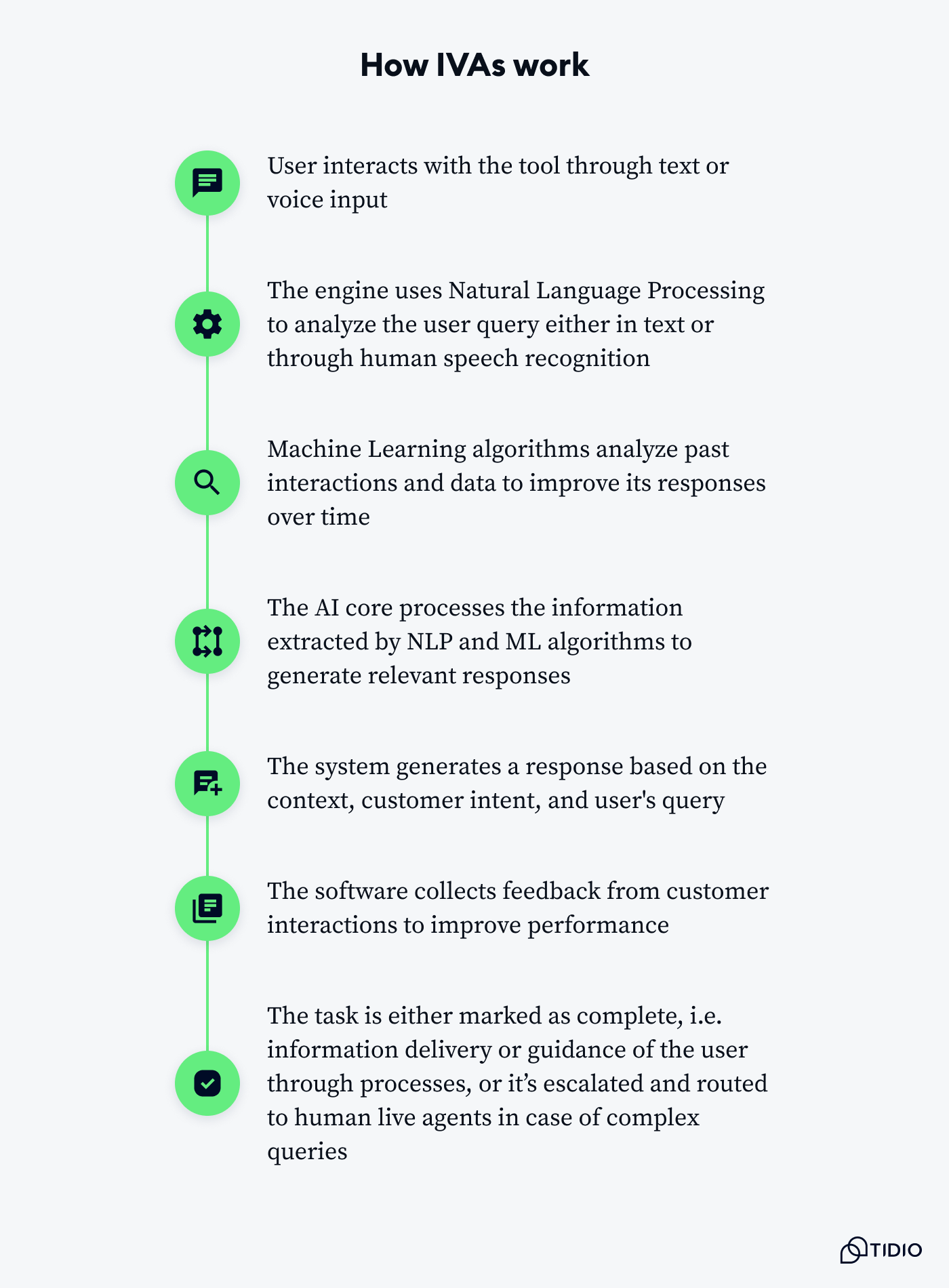
Read more: Check out a full guide to AI customer service and explore real-life examples and use cases.
Now, let’s see a practical example of AI virtual assistants in action.
Virtual assistant AI examples
Imagine a user who wants to purchase a shirt from an online store but is unsure about what size to choose. They decide to seek help from an intelligent virtual assistant on the website.
The intelligent virtual assistant, powered by NLP, ML, and AI technologies, understands the visitor’s request and responds by providing a comprehensive yet easy-to-follow guide for determining the correct shirt size. The IVA starts by suggesting measuring the chest circumference and then proceeds to advise measuring the arm length, waist, and hips.
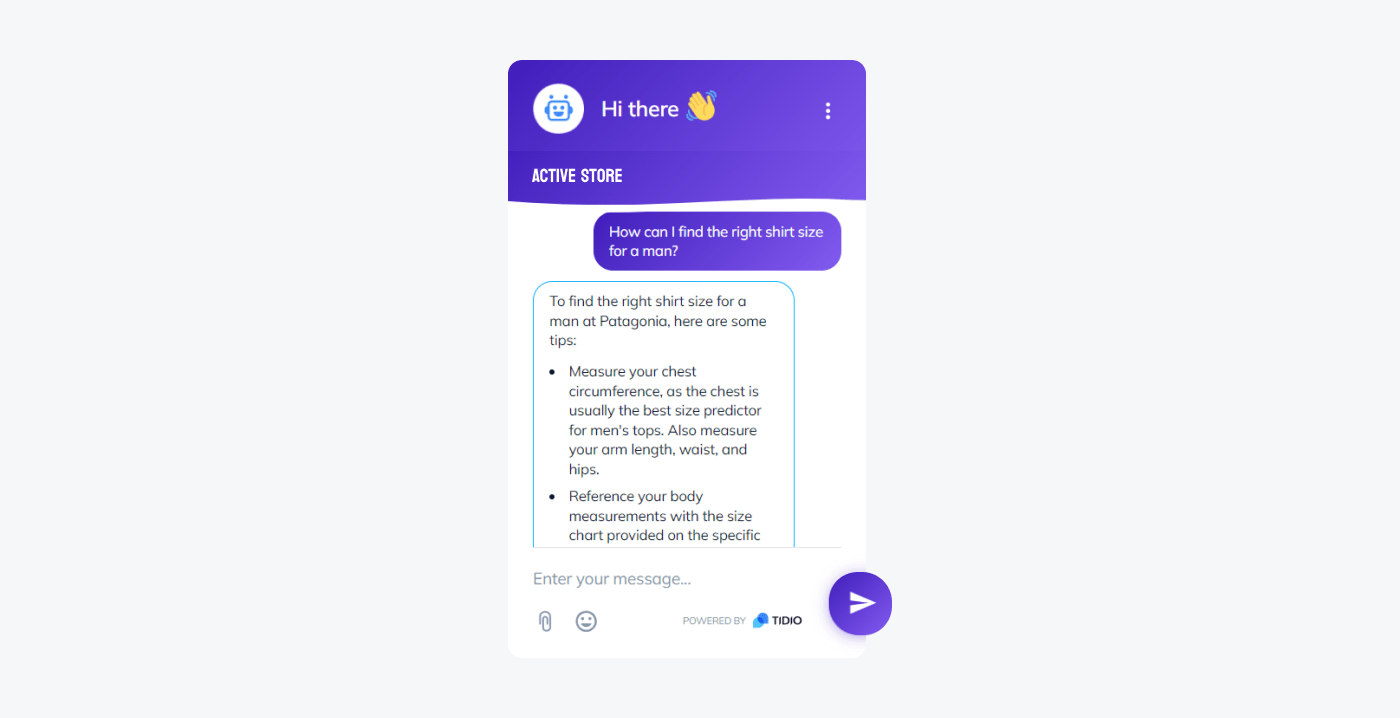
Following the measurements, the assistant recommends comparing the user’s measurements with the size chart provided on the specific product page. It also mentions that the store offers a Size & Fit Guide on its website, which includes more detailed charts and information, helping users make more informed decisions about sizing.
On top of that, the system also provides advice on sizing for bottoms. And if the visitor has any further questions, the virtual assistant offers assistance as well as additional details the user might need throughout their shopping experience.

Finally, the virtual agent shares direct links to the Size & Fit Guide and relevant product pages for further exploration. This ensures that the user has all the necessary tools and information at their disposal.
In this conversation, the IVA showcases several key features:
- Providing personalized advice
- Giving detailed instructions
- Offering proactive assistance
This real-life example perfectly illustrates how smart assistants can enhance the user experience by providing detailed and personalized information in a clear and friendly manner.
Read more: Explore everything you need to know about using Tidio’s Lyro conversational AI.
Make the most out of customer service efforts using virtual assistants
With that said, let’s explore different ways in which AI-powered virtual assistants can help enhance your customer service and support processes.
Intelligent virtual assistant use cases
Intelligent virtual assistants offer a wide range of practical applications across industries, providing personalized support and enhancing user experiences. In this section, we will explore the diverse use cases of IVAs in areas such as customer service, healthcare, ecommerce, and more.
Through these real-life examples, you’ll find out how IVAs can revolutionize interactions and deliver tailored assistance to meet unique user needs.
Let’s dive right in.
Customer service
IVAs are used in customer service applications to provide 24/7 support, answer common queries, and assist in troubleshooting issues. They create seamless interactions between customers and businesses, helping ease the workload of human agents in the process.
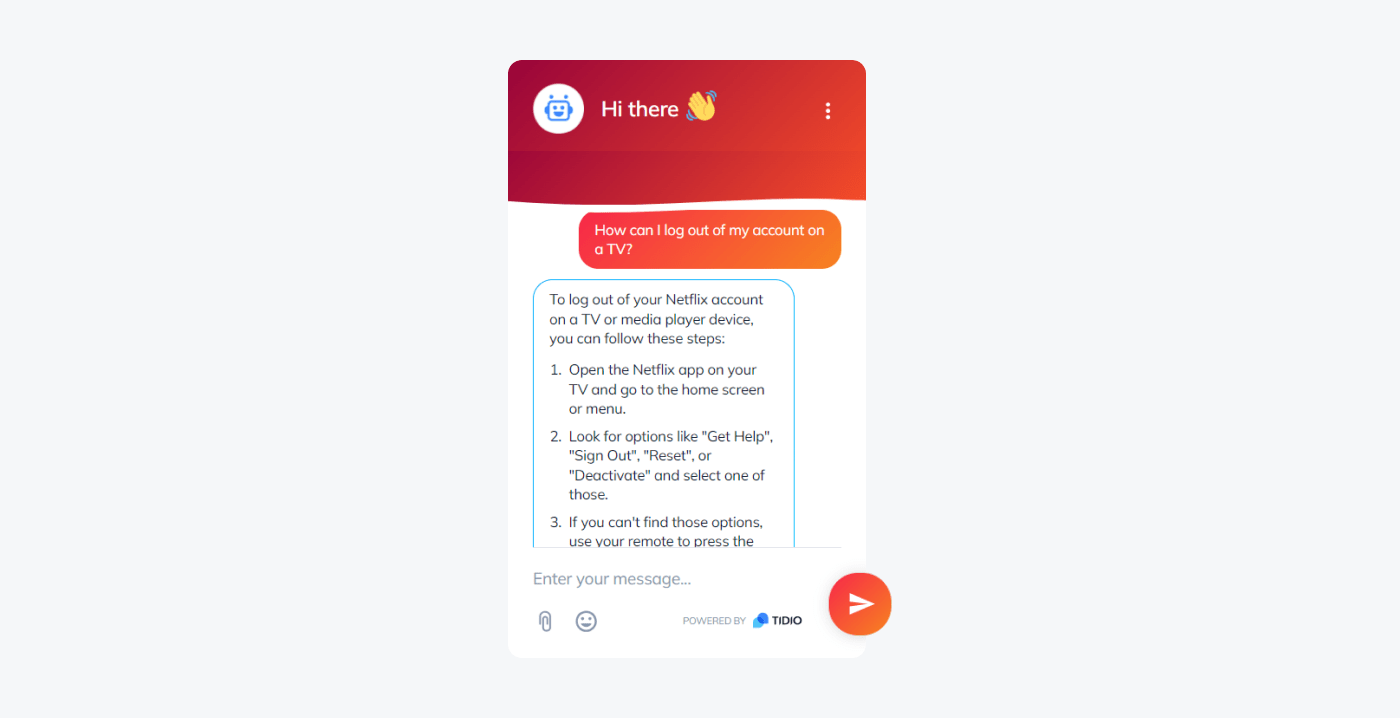
Read more: Find out about different AI customer support software available.
Healthcare
IVAs are utilized in healthcare settings to schedule appointments and provide medical information. They can also do things like offering medication reminders, assisting in health consultations, and enhancing patient engagement and support.
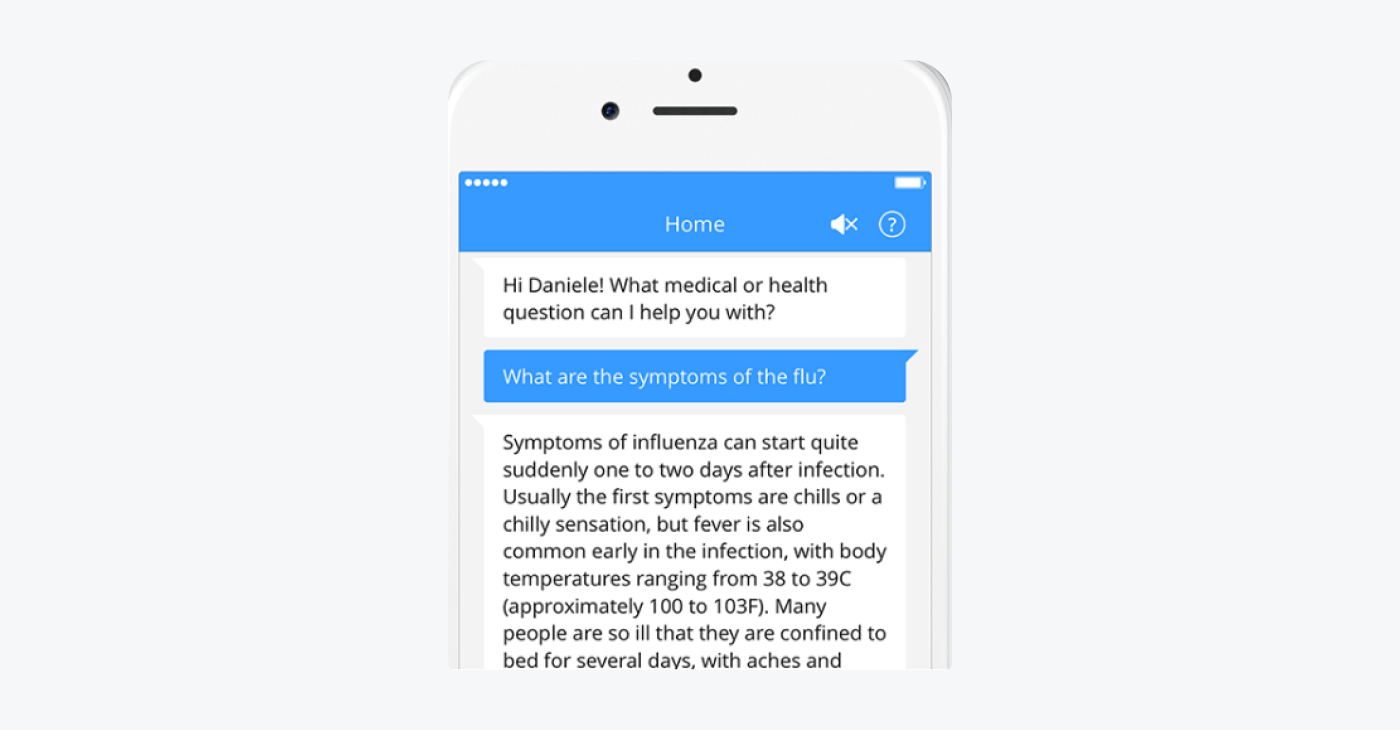
Ecommerce
Smart virtual assistants are integrated into ecommerce platforms to assist customers in product searches, recommend items based on preferences, and provide product information. They can also give order tracking updates, facilitate returns or exchanges, and offer personalized shopping experiences as a whole.
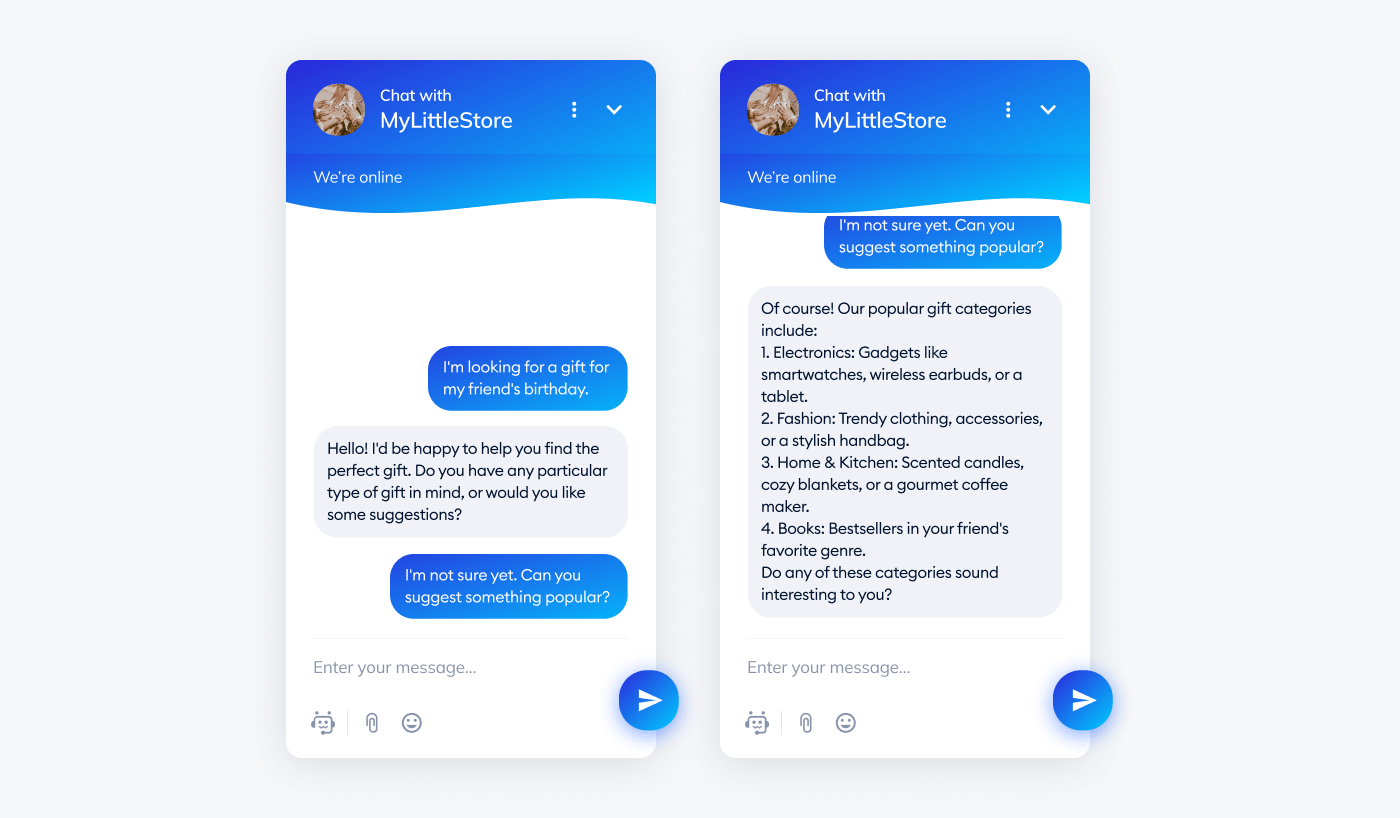
Read more: Find out all you need to know about ecommerce chatbots and explore the best solutions on the market.
Education
IVAs support educational institutions by answering student queries, providing learning resources, and facilitating virtual classroom interactions. Other things they can do include offering study assistance and guiding students through academic processes.
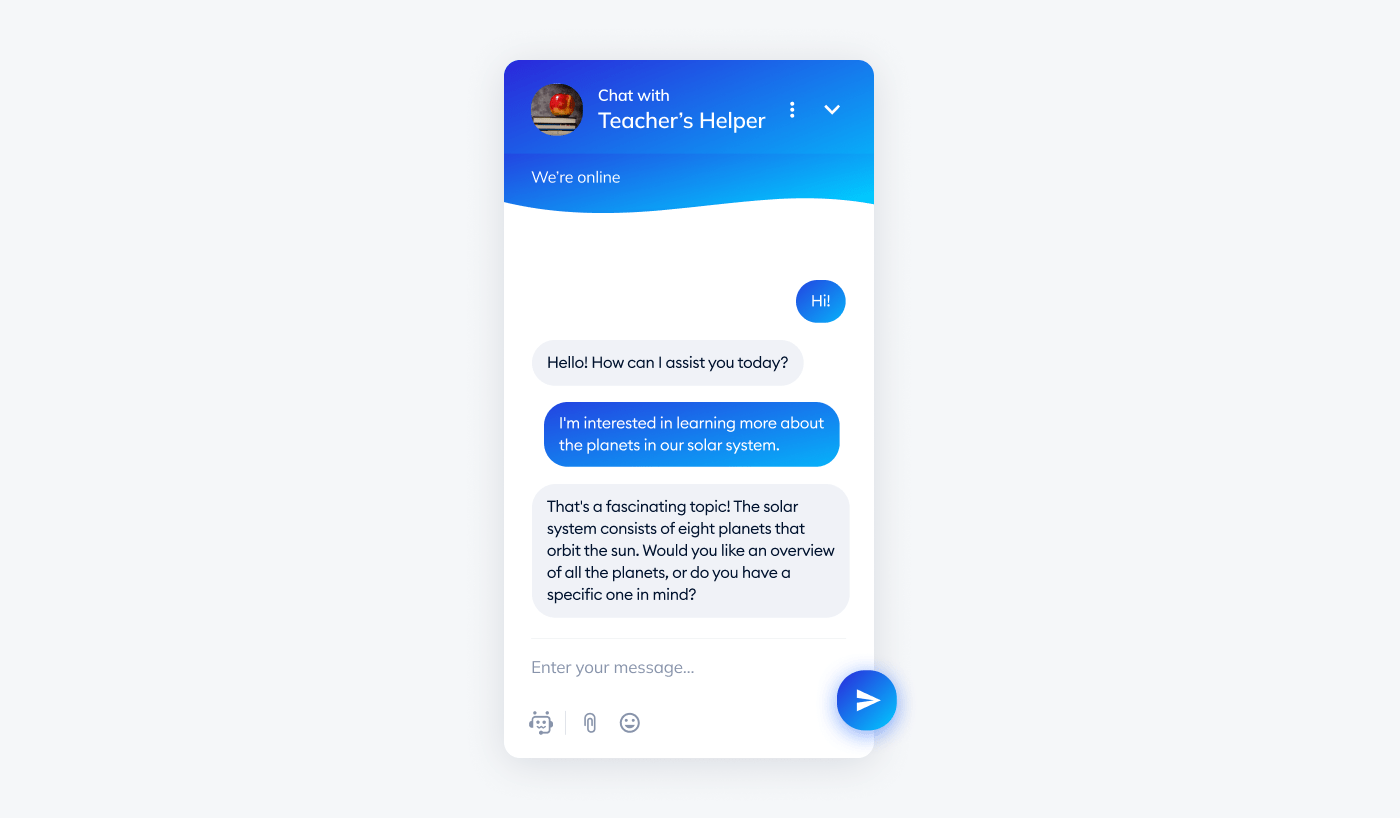
Read more: Explore the relevant insights and trends of AI in education.
Travel and hospitality
These virtual agents are used in the travel and hospitality industry to assist guests with booking accommodations. They provide local information about attractions and events, offer concierge services, handle reservations, and address guest requests or inquiries.
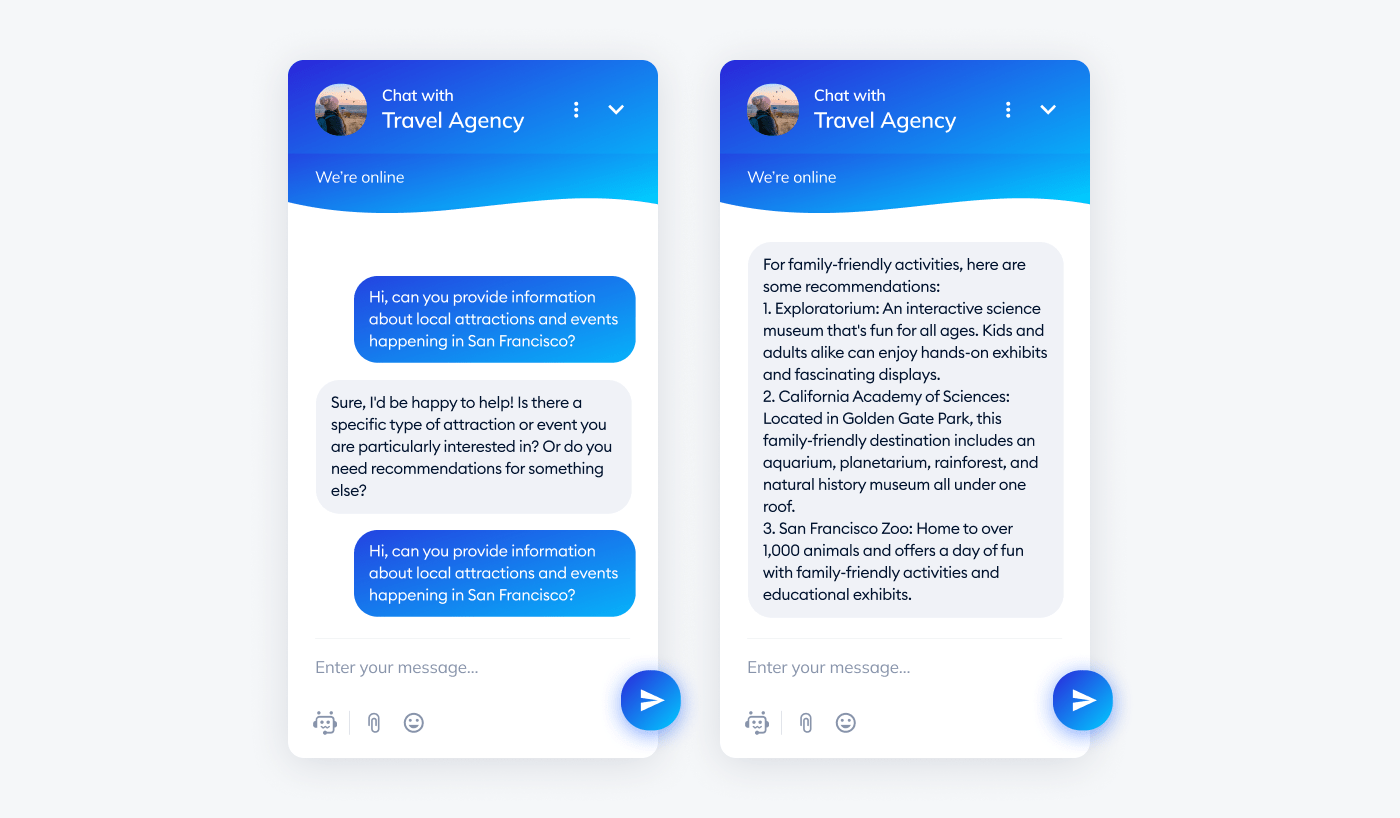
User: Hi, can you provide information about local attractions and events happening in San Francisco?
Read more: Be sure to explore diverse chatbot use cases while you’re at it. Also, check out some practical restaurant chatbot examples.
These examples only demonstrate the sheer versatility and effectiveness of smart virtual assistants, not their whole scope of capabilities.
Now, let’s explore the benefits of using them.
The benefits of using intelligent virtual assistants
Intelligent AI assistants have transformed the way businesses interact with customers, enhancing user experiences and boosting efficiency and scalability. So, it’s no surprise that the global IVA market is expected to grow from $8.1 billion in 2024 to as much as $75.5 billion by 2034.
Let’s highlight some other key benefits of utilizing IVAs across various industries:
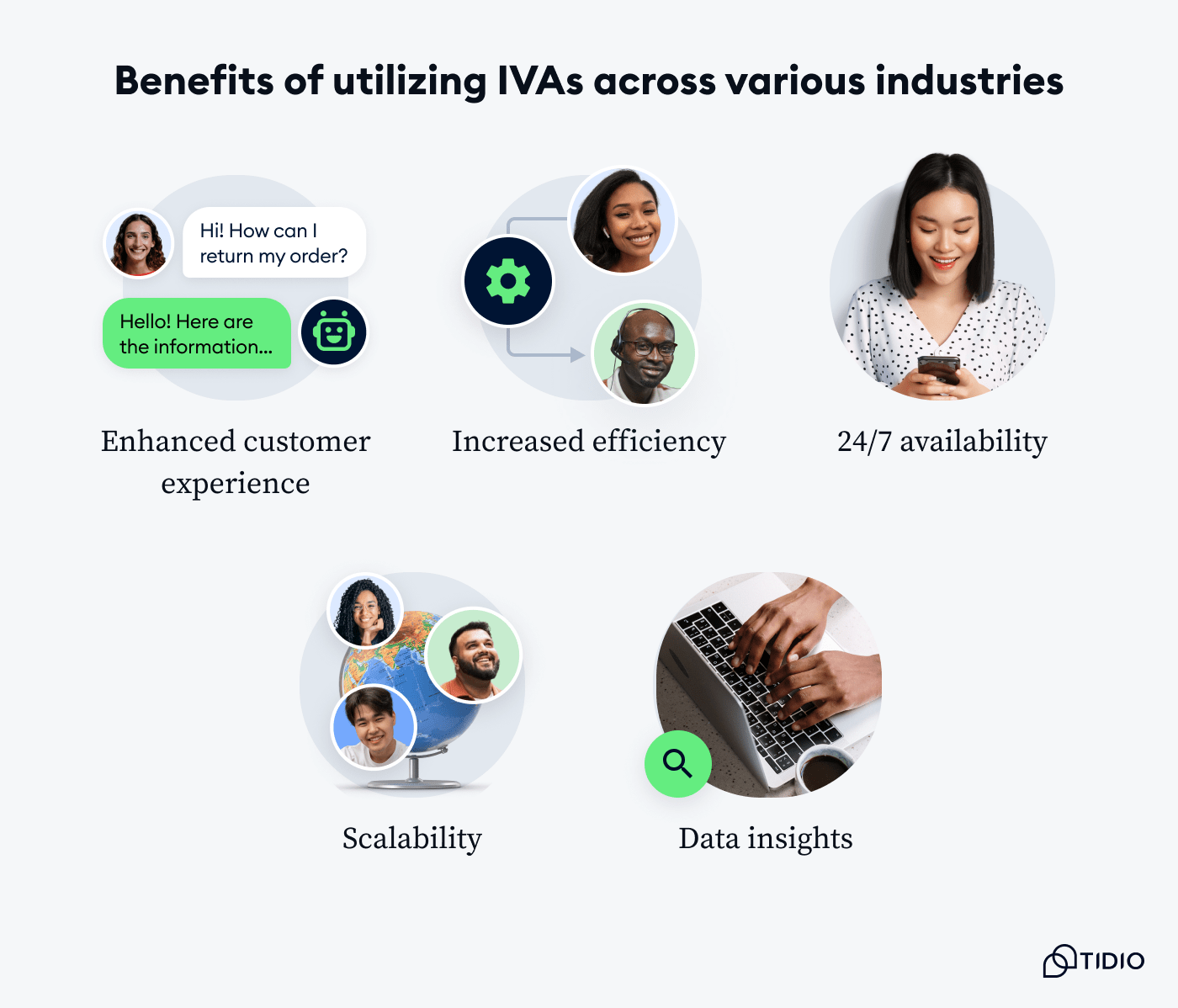
Enhanced customer experience
IVAs provide personalized and interactive support, leading to improved customer engagement and satisfaction. Users receive accurate and relevant information tailored to their needs, resulting in a more positive interaction. And this is important as 89% of consumers will buy from a company again if they received just one positive user experience!
Read more: Explore some of the top customer service chatbots available.
Increased efficiency
AI virtual assistants can automate tasks, handle routine inquiries, and streamline processes, resulting in time as well as cost savings for businesses. Not to mention that they also save time for support reps, allowing them to focus on other, more complex tasks. In fact, as many as 78% of CS professionals state that AI helps them spend more time on key parts of their role.
24/7 availability
Intelligent virtual assistants offer round-the-clock support, ensuring that users can access assistance and information anytime, leading to reduced wait times and enhanced customer service. In fact, a report suggests that a whopping 83% of users prefer to receive quick assistance right upon establishing contact.
Scalability
IVAs can handle multiple inquiries simultaneously, making them a scalable solution for businesses experiencing high volumes of customer interactions.
Data insights
Last but not least, these assistants can gather valuable data from user interactions, providing insights that businesses can leverage to enhance decision-making and improve services.
Read more: Find out the greatest benefits of chatbots for businesses and customers.
How to get started with intelligent virtual assistants
Contrary to what you might think, setting up AI-powered virtual assistants doesn’t have to be difficult at all. Due to all the breakthroughs in NLP and AI developments, with the right platform, getting started is a piece of cake.
To launch Tidio’s AI assistant Lyro, you can do this in 4 easy and intuitive steps.
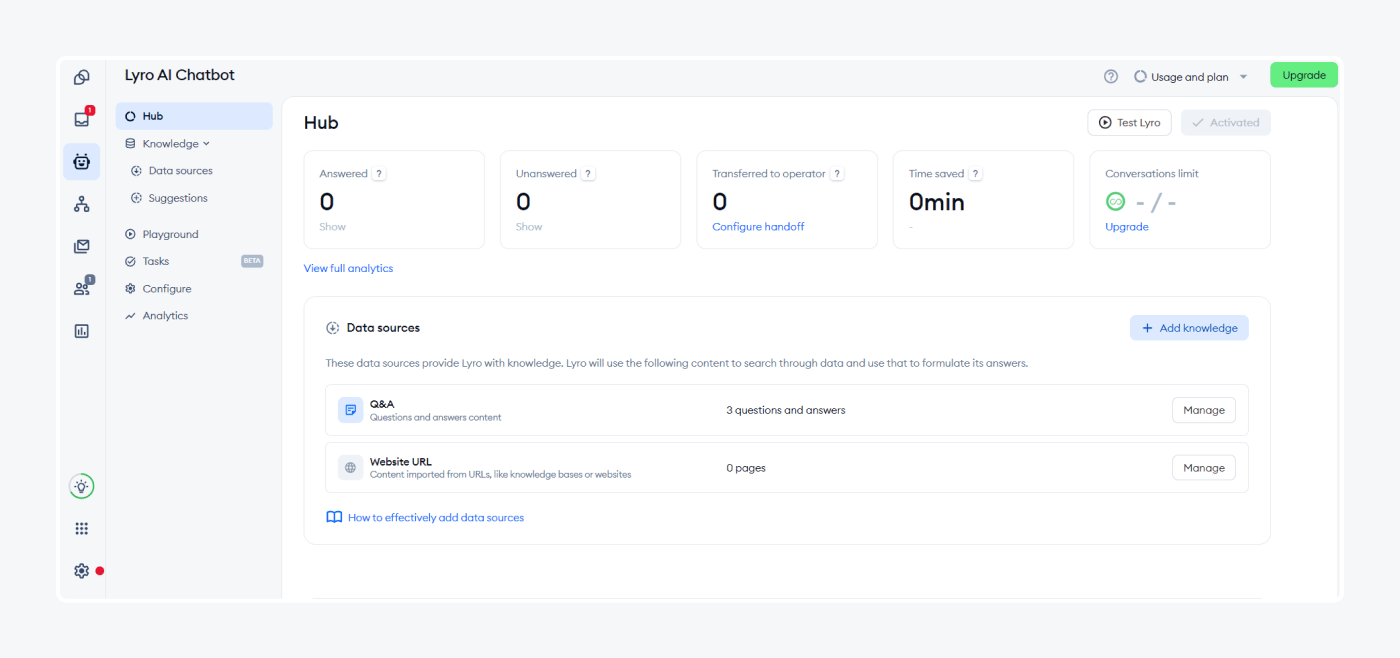
So, here’s how to go about it using our own tool:
- Launch the Lyro AI chatbot option located in the Tidio panel
- Add knowledge to Lyro by manually adding question-answer pairs or by pulling an FAQ from your website’s URL
- Use the Playground option to test out your bot’s knowledge
- Configure options such as Lyro’s personality, channels, and how and when it should switch to an operator.
And you’re all set! Lyro intelligent chatbot is ready to go live.
Finally, it’s time to take a look at how you can leverage these handy assistants for your own needs.
Tips for implementing virtual agents
Implementing intelligent virtual agents requires careful planning and strategic decision-making to ensure successful integration into your business operations.
We will delve into best practices for effectively introducing IVAs across various applications and industries.
Let’s check them out:
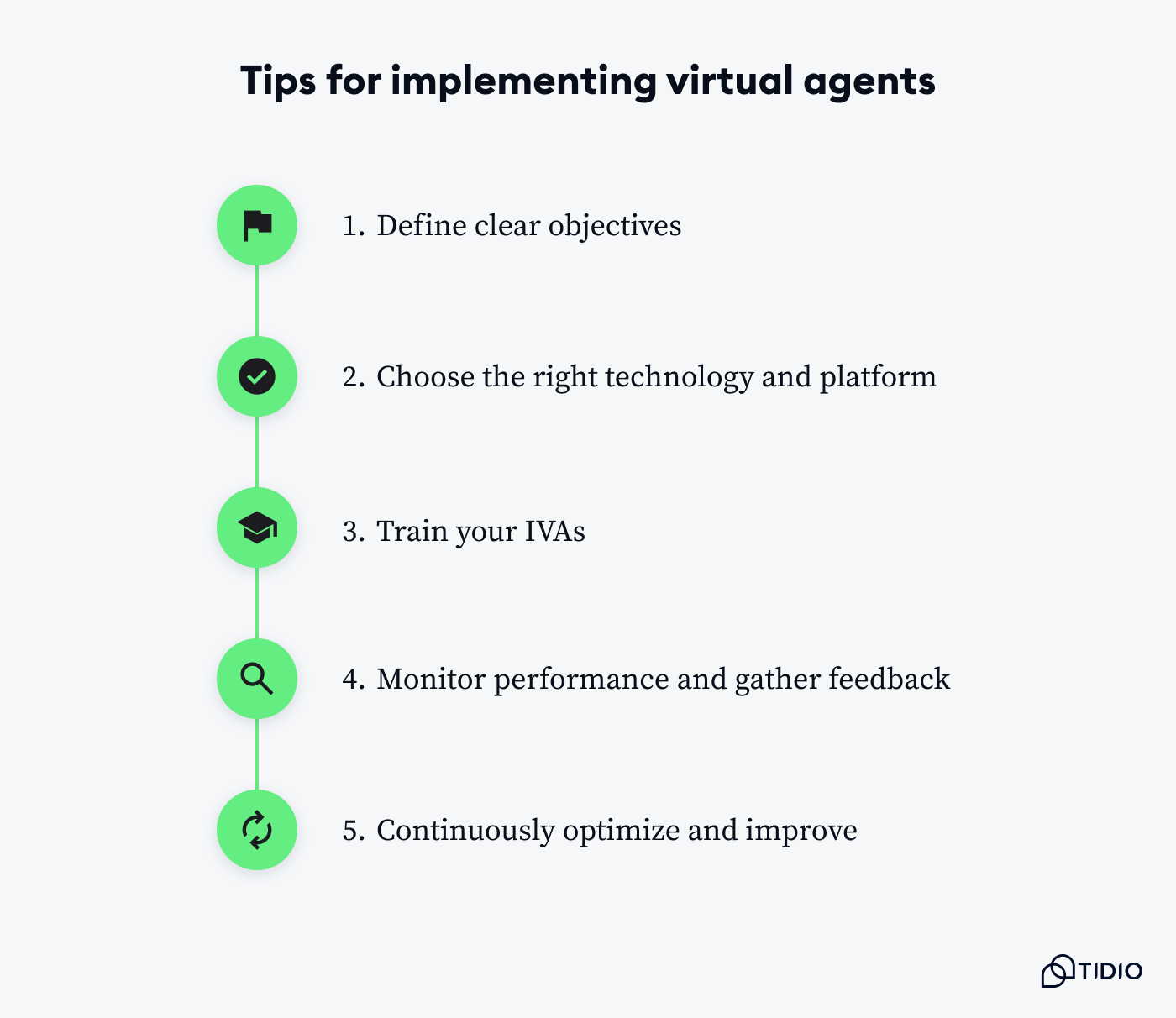
1. Define clear objectives
Before implementing this smart technology, it’s essential to clearly define your objectives and identify specific use cases where these smart agents can add the most value. Determine the primary goals you aim to achieve with them, such as improving customer service, automating tasks, or enhancing client experiences. By outlining clear objectives and use cases, you can tailor the implementation process to meet your organization’s unique needs and maximize the benefits of IVAs.
2. Choose the right technology and platform
Selecting the appropriate platform for your virtual assistants is crucial to their successful implementation. When making your choice, you should consider factors such as NLP capabilities, integration options, scalability, and customization features.
Whether you opt for a pre-built AI platform or develop a custom IVA solution, ensure that the technology aligns with your organization’s requirements and supports your desired functionalities.
3. Train your IVAs
Training chatbots and virtual assistants to effectively interact with users and perform tasks is essential for their successful implementation. Develop a comprehensive training program that covers various scenarios, communication styles, and responses that IVAs may encounter.
Provide ongoing training and updates to ensure that your IVAs continue to learn and improve their performance over time. Additionally, offer training to your staff and stakeholders on how to interact with IVAs and leverage their capabilities in daily operations.
4. Monitor performance and gather feedback
Once IVAs are implemented, regularly monitor their performance metrics and gather user feedback to assess their effectiveness and identify areas for improvement. Track key performance indicators (KPIs) such as response time, customer satisfaction, task completion rates, and accuracy of responses. Analyze user feedback, behavior patterns, and interactions to make data-driven decisions and refine your IVAs to better meet user needs.
Read more: Explore key chatbot analytics and KPIs.
5. Continuously optimize and improve
Implementing AI virtual agents is a process that requires ongoing evaluation, adaptation, and improvement. So, be sure to continuously gather insights from user interactions, analyze data trends, and go over your IVA strategy to enhance their performance and usability.
On top of that, keep up with the latest advancements in AI technologies and incorporate new features or functionalities to keep your IVAs up-to-date and aligned with evolving user expectations. By doing so, you can ensure that your IVAs remain effective and deliver optimal results for your organization.
And there you have it.
If you adhere to all these tips, you will get to unlock the full potential of IVAs to achieve your customer service goals.
Intelligent virtual agents for customer service: key takeaway
Intelligent virtual agents are revolutionizing customer interactions and contributing to the overall operational effectiveness across industries. By leveraging advanced AI technologies IVAs offer personalized and seamless experiences that drive enhanced customer engagement and satisfaction across various industries.
By following best practices and refining your IVA strategies, your organization can stay ahead of the curve and position itself for success. We suggest that you embrace the potential IVAs hold and start paving the way to customer service excellence as soon as today.
Make the most out of customer service efforts using virtual assistants
FAQs
An intelligent virtual assistant is a computer program or AI-powered entity that uses artificial intelligence and natural language processing to provide personalized assistance, interact with users in a conversational manner, and perform simple tasks.
Examples of intelligent virtual agents include voice assistants like Amazon’s Alexa, Apple’s Siri, Google Assistant, Microsoft’s Cortana, and IBM’s Watson Assistant. This also includes industry-specific IVAs, with self-service bots like Tidio’s Lyro.
The cost of implementing an intelligent virtual assistant can vary depending on factors such as customization, complexity, features, and integration requirements. Costs can range from a few hundred to several thousand dollars, including initial setup, development, and ongoing maintenance expenses. That being said, there are also cheaper but effective options for self-service virtual assistants. For example, Tidio’s Lyro is available for free for up to 50 conversations. If you want to include more conversations, the pricing can range from $39 to $140 a month.
While both chatbots and intelligent virtual assistants interact with users, IVAs are more sophisticated, AI-based bots capable of understanding context. They also provide real-time personalized responses and perform complex tasks. In comparison, chatbots are typically rule-based and limited in functionality.
Yes, Amazon’s Alexa is considered an AI virtual assistant. It uses artificial intelligence to understand and respond to user commands, control smart devices, and perform a variety of tasks through voice interactions.
Benefits of intelligent virtual assistants include improved customer service, increased efficiency, cost savings, 24/7 availability, scalability, data collection insights, and enhanced user experiences.
Industries such as customer service, healthcare, education, finance, ecommerce, and hospitality have a significant need for virtual assistants to handle inquiries and provide support.

